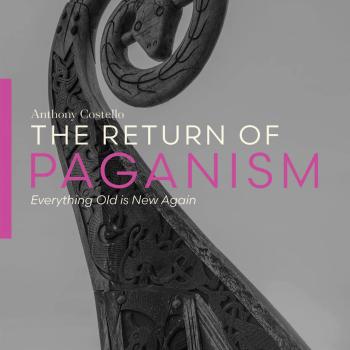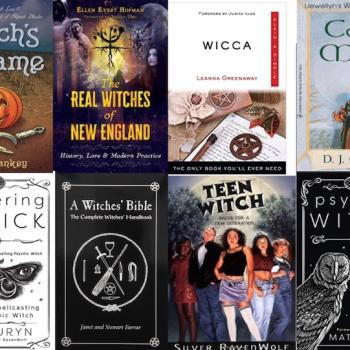Back in the days when I ran Patheos Pagan I could always count on articles adjacent to Christianity to rack up the pageviews, especially articles antagonistic towards it. Away from Patheos Pagan you see this same sort of thing in the memes that circulate throughout Pagan Social Media, many of which aren’t true: St. Patrick and the Saints, Easter and Ishtar, and Jesus and Horus. We seem to love things that suggest Christians are stealing from us, even if that’s not really historically the case.

Even though we live in a society where the fastest growing religious grouping are the “nones” (up to 25% in some surveys) many Pagans still look to Christianity to justify our existence. I found this attitude present in the recent Patheos Pagan article The Bible Is A Necessary Resource For Pagans As Well by Ann Trip. The blog Nature’s Sacred Journey has always been squarely focused on Unitarian-Universalist Pagans, and in a UU context, one might very well need the Bible in order to talk with other parishioners. There are some UU congregations that might be nominally considered Christians, and certainly many members of that fellowship. Using the Bible to find common ground in that one particular group makes sense to me, what doesn’t make sense to me is the idea that any of the rest of us need a Bible as a “necessary” resource.
Our greater society expects us to know a few Bible stories: Adam and Eve, Moses, Jonah and the Whale, some Jesus stuff, but those stories are so common place that one doesn’t really need a Bible to know them. And in some instances the versions of those stories that most people truly know are a composite of several different tales stitched together. (This is especially true of anything having to do with Jesus’s birth and death.) It’s possible that you read some of those stories in a literature class, since the Bible is essentially a piece of mythological literature. Various Bible translations have also influenced culture, I specifically remember a few excerpts from the King James Bible being in my 10th grade English book. But none of that is the equivalent of needing to own a Bible.
Early in her article Trip brings up why you need a Bible:
If you don’t know what’s in the Bible, you can’t defend yourself when radicals try to use it against you.
But I don’t care when radicals use the Bible against me because I don’t believe in the Bible. Using the Bible to defend myself against the Bible gives the Bible a certain power that it doesn’t really have in my life. We might as well argue about what Fox News is saying about me. I don’t give a damn either way. Both sources are slanted to fit a certain world view, one that is not my own. And despite what some people think (and what might happen in January of 2025) right now we still have some separation between church and state. There is a lot in our culture that might be “culturally” Christian, but there is nothing suggesting that we are all mandated to be Christians.

I know what some of you might be saying right now, “But Jason, how can I argue against Christians if I don’t know what’s in the Bible?” I would suggest that you probably shouldn’t be arguing with Christians right now anyways. The people who are going to argue with you closed their minds long ago. They don’t want to engage with you in any meaningful way, and they certainly aren’t going to change their minds because you quoted one Bible verse that can be contradicted by four other Bible verses. Besides, most people who want to argue with you about Pagan vs. Christian garbage have probably not read the Bible anyways, and are simply reciting talking points from right-wing sewers.
A serious debate about Pagans vs. Christians in our society should include quotes from the Constitution (not an American, insert your country’s document here), the federal judiciary, and laws passed by Congress. Further debate might revolve around the secularization of many “religious” holidays (like Christmas), and certainly you can quote science to refute unscientific ideas. Reason and the law are our best allies when dealing with people who might try to persecute us because of our religious/spiritual leanings.
I admit, it can be fun to mess with Christians by quoting their holy text, but the ones I’m poking fun at don’t really care what’s in their book. They’ve cherry picked the hateful parts that justify their own beliefs, and have chosen to ignore all the rest. None of them want to hear me talk about camels, rich people, and the eye of a needle. I wish some of them did, but the only way that type of material is going to get through to them is if THEIR faith leaders have a change of heart and start preaching something a little more honest. As a Witch it is not my responsibility to teach Biblical literacy to Christians.

There are a small smattering of Pagans out there who deal with “interfaith” issues, and if you feel like you need to be on some of sort of religious council you might want to familiarize yourself with the Bible a little bit more than average. But I feel like I should also point out that the people who are likely to be on an interfaith council are not your local zealots or radicals. The people engaging in interfaith work are already open to cooperation and tolerance. The local fundie Trump loving evangelical church is not likely to be a part of an interfaith group. As a Pagan it’s far more likely that the members of interfaith group are simply going to be curious about your beliefs. Most of us have enough trouble defining Pagan and Witch, let alone knowing all about another group’s religious texts.
I find mythological stories and wisdom teachings interesting, and both of those things are present in the Bible. But they have very little to do with my Pagan practice, and unless I’m using a cunning-craft-related spell from the early modern period, there’s very little likelihood of the Bible showing up in my Witchcraft. The Bibles in my house are cherished mementos from a very different chapter in my life, and I see very little reason to knock the dust off of them.
















